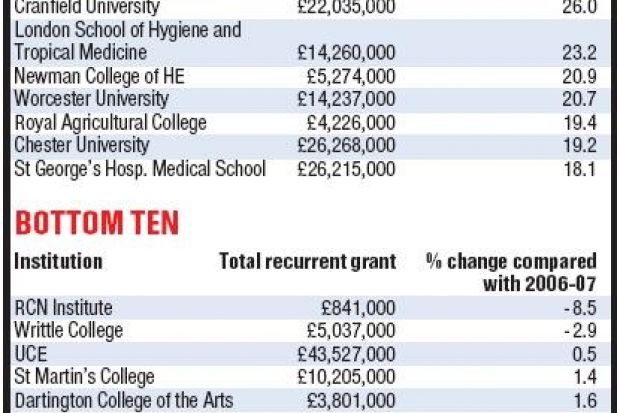English universities will be able to offer 70,000 extra places over the next two years. Tony Tysome reports
English universities and colleges have got the green light to open their doors to another 70,000 students over the next two years, backed by a £431 million boost in grant funding.
The universities will receive a total of £7.1 billion from the Higher Education Funding Council for England in the next academic year, 6.4 per cent more than allocations in 2006-07. This allows for 5 per cent growth in student numbers.
The total grant represents a 3.7 per cent real-terms funding increase compared with last year. But the good news was tempered by the revelation that some 22 institutions, including Middlesex and Nottingham Trent universities, would receive real-terms funding cuts.
Hefce, unveiling its provisional allocations this week, predicted that the growth in student numbers would edge the sector closer to the Government's target to get 50 per cent of under 30s experiencing higher education by 2010.
At the last count, in April last year, it was estimated that 42 per cent of 18 to 30-year-olds had gone on to higher education.
David Eastwood, Hefce's chief executive, said: "The recent Universities and Colleges Admissions Service figures showing rising demand for undergraduate places are very welcome in view of this planned growth.
"The additional funded numbers we are providing will add to the diversity of the student population and help to increase participation rates in higher education."
Institutions will be able to recruit an extra 33,000 full-time equivalent (FTE) students in 2007-08, and a further 16,000 FTEs up until 2008-09 - amounting to an approximate total additional headcount of 70,000.
A breakdown of the additional funded numbers provided by Hefce shows that nearly half were expected to go to foundation degree programmes, based largely in new universities, higher education colleges and mixed economy colleges.
The total grant includes a 4.5 per cent real-terms rise for teaching, bringing the unit of funding per FTE student up to £4,350 - slightly ahead of inflation. But there is no inflation-beating rise in funding for widening participation after last year's real- terms increase of 18.5 per cent.
Total funding for research will increase by 2.7 per cent above inflation.
The £1.4 billion grant includes £892 million for mainstream research, £180 million to support high quality research funded by charities, nearly £28 million for London weighting, £193 million to support postgraduate programmes in departments with a research assessment exercise rating of 4 and above, and more than £24 million for the "best 5-star" departments.
Recent high-profile closures of physics and chemistry departments have prompted funding chiefs to throw a lifeline to "very high-cost and vulnerable science subjects" with an additional £25 million next year.
The extra money is the first tranche out of a total £75 million over three years announced by Hefce last November. This is earmarked to support and stimulate growth in physics, chemistry, chemical engineering and mineral, metallurgy and materials engineering.
Also new for next year is a £60 million "business research" element built into research grants, based on the amount of income academic departments received on average from UK industry, commerce and public corporations in 2003-04 and 2004-05.
Hefce said that money for this new feature had been found from within the existing research budget, because the next Comprehensive Spending Review meant the funding council had to be "cautious about the funding that may be available" from next year.
tony.tysome@thes.co.uk </a>
ALLOCATIONS AT A GLANCE
- Total grant = £7.1 billion (up 6.4 per cent)
- Teaching = £4.5 billion (up 7.2 per cent)
- Research = £1.4 billion (up 5.4 per cent)
- Widening participation* = £354 million (up 2.7 per cent)
- Special funding** = £449 million (up 3.9 per cent)
- Capital grants = £738 million (up 4.8 per cent)
- High-cost science subjects = £25 million
* Included in the total for teaching
** Special funding promotes specific policies such as widening participation or contributes towards additional costs for institutions, such as supporting national facilities.
Register to continue
Why register?
- Registration is free and only takes a moment
- Once registered, you can read 3 articles a month
- Sign up for our newsletter
Subscribe
Or subscribe for unlimited access to:
- Unlimited access to news, views, insights & reviews
- Digital editions
- Digital access to THE’s university and college rankings analysis
Already registered or a current subscriber? Login
